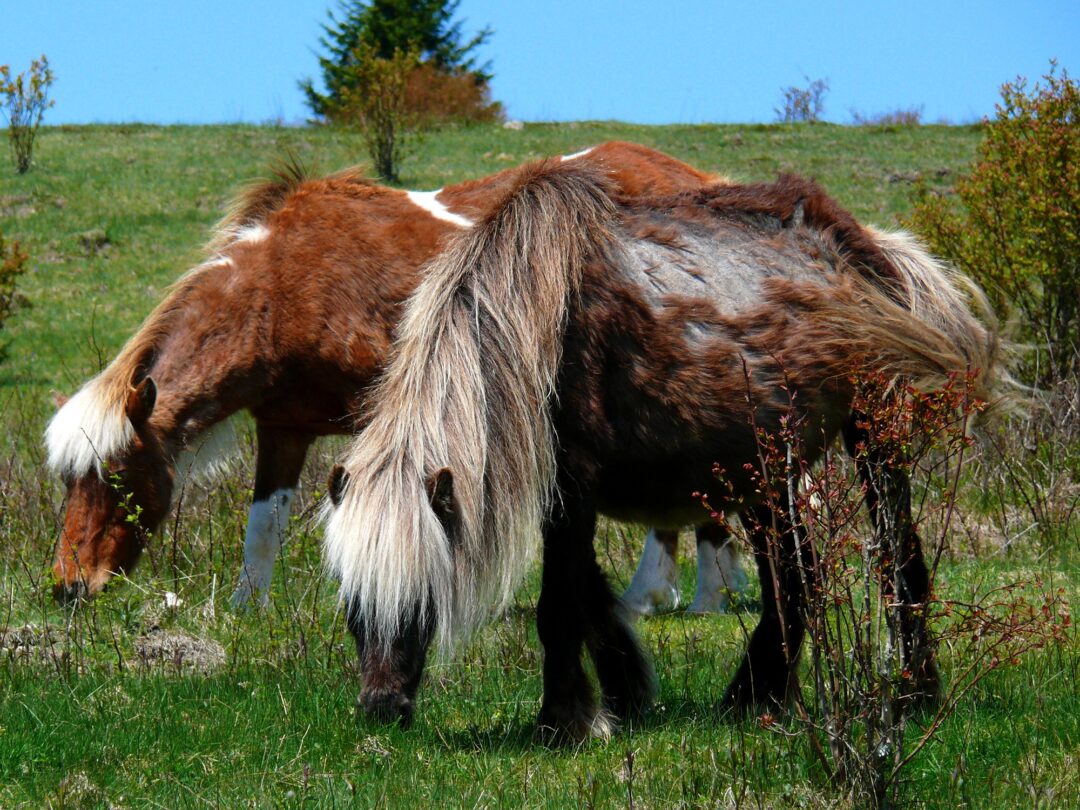Wild ponies in the Grayson Highlands, southern Virginia.

One hot July afternoon earlier this summer, my husband Nat and I were huffing up the Marlborough Trail on Mount Monadnock in southwestern New Hampshire. I spotted four men above me, heading down. I pulled myself over a boulder and tugged a bandana up from my neck and over my face (pandemic hiking). I caught up to Nat, who said, “One of them asked me if we had a headlamp.”
I was disgusted. “How patronizing. We’re almost to the top.”
Nat said he took it as well-intentioned, even though he was not used to the idea of being an old man. This brought up an ethical question I struggle with. Is it condescending to make a visual judgment and offer free advice?
For decades I used to run into men on mountains who would ask if I knew how steep or cold this mountain was. They’d ask if I had a raincoat. I was loaded with energy and wearing a full backpack. I would just smile.
Today I feel defensive. Strangers can’t tell by looking that what I lack in brute strength I reap in wisdom (I hope). They don’t know I’ve logged thousands of miles. I edit a mountaineering journal, for goodness’ sake, with an accidents report that describes scenarios of injured people who forgot lights. Still, truth is, the man who asked about the headlamp hit a nerve.
We’d actually left it in the car and only had the light on my iPhone. Ha, the joke’s on us. And I do go more slowly now. I can’t spontaneously run up Monadnock in an hour the way I used to. If I were to fall, even four hours before sunset, I might need a headlamp while waiting for help.
All this brought up a memory of strangers helping me in a most respectful way.
On a bright April day many years ago, the second day of an overnight backpacking trip in southwestern Virginia, my daughters Elizabeth and Annie and I rested after lunch in an old corral near Mount Rogers. A ranger drove up in a pickup, crunching gravel. I jogged over to his window. I asked, pointing, “Does that trail connect back to the Appalachian Trail?” I opened my Appalachian Trail Conservancy map.
“There’s a shorter way,” he said. He pointed to a dashed line on his Grayson Highlands State Park map and handed me the map. “That will save you time. A horse trail.”
He is not the helpful stranger of this story.
We strapped on packs and started trudging up the shortcut, picking our way over loose sand and stones between rhododendrons. I chatted, encouraging the girls, who were just 9 and 7.
“See these rhododendrons? I love the way they reach out.” A stream flowed straight through blotches of sun, down the trail. I smelled something bad.
Next I saw a mass of blond hair flattened in the shallow water. I saw teeth and an eye socket. A dead horse.
I remembered that wild horses roam the Grayson Highlands. I must tell my daughters. I turned, woodenly. “Uh—stay to the right, girls. Don’t be scared, but—there’s a dead horse.”
Silently they picked their way over it. I chirped, “It’s natural to die! It’s even normal for a horse like this to stay where it died.” But I felt terrible.
The stream turned away from the path, and we came to a fork the ranger had not explained. I turned us left. We hiked a long way into a sunny meadow with a view of Mount Rogers, the highest point in Virginia. The girls’ hair blew in the wind as they snacked on M&Ms. I took their picture and worried we were behind schedule.
At the clearing’s edge, I sank to my knees with both maps. Oh no. Our route had added three miles to our eight-mile day. I said, “OK, the good news is that I know where we are!”
We slogged on, hardly speaking. We crossed a stream. I needed to pump water, but I wanted us to get out before sunset. Another ridge rose ahead. I wailed inwardly. Where is the parking lot?
I heard rustling. Coming around a wooded bend, here came two strong-looking men with full packs. We all stopped. I asked, “Do you know how far it is to Massie Gap?” My voice wavered.
They paused as if to gauge whether I knew what I was doing. They frowned. One man nodded.
“Go up over that ridge,” he said, businesslike, handing me his water bottle, which I took and poured into my empty one. He pointed to the bush-covered ridge just behind him. “Massie Gap is that way, but you have to go over that mountain first.” I realized that they had decided to help me save face in front of my kids.
Turning with my best late-day field voice, I said, “OK, girls, it’s just a mile over the ridge, and then it’s all downhill!”
Later that night, tucked into beds at our friend’s house, Annie said, “Mama? I’m afraid of the horse.”
“Oh, Annie.” I said, and hesitated.
Through the dark came Elizabeth’s quiet voice. “Think about cupcakes.”
I thought this was excellent advice: hopeful, respectful, gentle. Something that’s hard to get right—especially, perhaps, right now.
About this article:
This appeared in Appalachia 72 no. 1 as the editor’s column, “The Long Way Home: Is it help or is it ‘help’?” For the whole issue, visit the journal’s open-access archive. To subscribe to Appalachia, go here.
